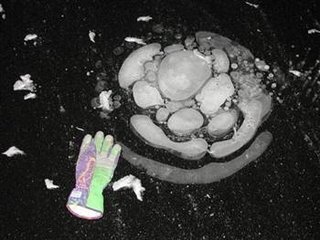On flipping through a Versace book
There are pictures of both male and female models, and one can divide the style of the pictures taken by the gender of the models as there is such a great disparity in attitude (of both the subject and the photographer/stylist/possibly Versace himself? well, with whoever took those pictures).
The women are beautiful. Perfect in every way imaginable, whether they're smiling, gazing soberly at the camera in the awareness that it's there, or looking away as if they thought they were alone. There's one startling similarity though, none of them are human. They look frigid in the untouchable way, almost like abstract pictures of...something else. Fitzgerald would have described their eyes as "absent of desire" (like his women, in The Great Gatsby particularly).
But the men, they're different. The photographs of the male models are more organic, whether in obscenely bright colours or in black-and-white, whether they're wearing Versace's totally impractical clothing (meaning that no real man would even think of wearing them) or glorying in their butt-nakedness with just 3 inches of that bit and the bum concealed by just the camera angle or through some other, more innovative means that I shan't go into here (no, seriously, just buy the bloody book and see for yourself--you wouldn't know what you were missing otherwise). They actually have that gleam in their eye, yes, of course they know what's going on. Of course, they're like, so totally aware that this is all an exercise in very Italian, very high camp in the tradition of the big daddy of all lovers of naked men--Michelangelo. They resemble
the giant nude figures sitting around the scene of the Creation of the world, doing nothing but revelling in their sheer size. Bigger than life.
In your face. Yes, you just can't look away, never mind if it makes you feel uncomfortable or anything. It stands out, it's a "very happy, very snappy, very gay" shout-out against the ordinary.
It never fails to put a smile on my face. It's just so unatural and humorous and bawdy and unexpected. It is wonderfully ridiculous. It laughs at itself, which is indeed very rare in this rapidly darkening, over-serious age.

